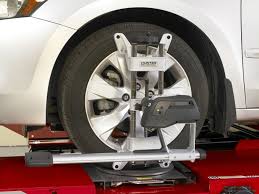Taking care of our tires is a vital part of car care for Denver area drivers. We know they have to be replaced when they wear out, but tires also require some important preventive maintenance. This maintenance will improve fuel efficiency and extend the life of your tires, so it’s well worth the effort and expense get it done. Tire maintenance includes keeping tires properly inflated, rotating tires, and balancing wheels.
The recommended tire pressure for a vehicle’s tires is printed on a sticker on the inside of the driver’s side doorjamb. A lot of engineering goes into calculating the correct pressure, so it’s a key number for drivers to know. Not following this recommendation can throw off your suspension system and can lead to expensive tire damage. Underinflated tires wear out more quickly than properly inflated tires. Vehicles also get better traction, handling, and fuel economy on properly inflated tires. Check your tire pressure at least once a week and add air if necessary.
Don’t be tempted to add a bit of extra air to your tires when you fill them. Overinflated tires will cause the center tread to wear unevenly because of improper contact with the road. It will also cut down the handling performance of your vehicle.
Rotating tires allows all four tires on a vehicle to wear evenly. Front tires get more wear than rear tires because they do most of the work on turns. Tire rotation allows all of the tires to spend time on the front of the car so they all experience the extra wear.
 For most vehicles, tire rotation is simply a matter of moving the front tires to the rear and vice versa. Some vehicles, however, recommend a cross-rotational pattern. Other vehicles use asymmetrical tires, which means the right tires have to stay on the right side of the car and the left tires on the left. Some vehicles use differently sized wheels on the front and back of the car and should not have their tires rotated.
For most vehicles, tire rotation is simply a matter of moving the front tires to the rear and vice versa. Some vehicles, however, recommend a cross-rotational pattern. Other vehicles use asymmetrical tires, which means the right tires have to stay on the right side of the car and the left tires on the left. Some vehicles use differently sized wheels on the front and back of the car and should not have their tires rotated.
What kind of rotation do you need? Check your owner’s manual or talk to your reliable Davis Repair service professional. Your owner’s manual will have information about how to rotate your vehicle’s tires as well as letting you know how often you should get it done. For most vehicles, that’s usually every 5,000 miles. Your honest Davis Repair technician can also offer advice about tire rotation based on the actual wear on your tires. A quick tire inspection can indicate whether or not your tires are due to be rotated.
When it comes to tire maintenance for Centennial car owners, wheel balancing is usually what we know least about. Balancing a wheel is necessary to keep it in constant contact with the road. If a tire is not balanced properly, it actually hops along the roadway. You can feel this hopping as a vibration in your steering wheel if the unbalanced tire is a front tire. You’ll feel the vibration through your seat if a rear tire is unbalance. Properly balancing your tires is essential and will extend their life span, improve handling, and improve the safety of your vehicle. When you replace your tires, the new tires need to be balanced.
Never use different sized tires on the same axle of a vehicle. In other words, your front tires need to be the same size and your rear tires need to be the same size. Mixing sizes can lead to some serious handling problems for car owners.
If you have an all-wheel drive or four-wheel drive vehicle all four tires need to be the same size. If your tires are wearing out, you can sometimes make a new tire purchase fit within your budget by only buying two tires at a time. When you do this, the new tires should be installed on the rear of the vehicle. Rear tires are more in need of the traction than your front tires to avoid spinning out on slippery surfaces. If you drive a vehicle around Denver, you need tires, so you need to know how to care for them. The safety of your truck can depend on the condition of your tires.